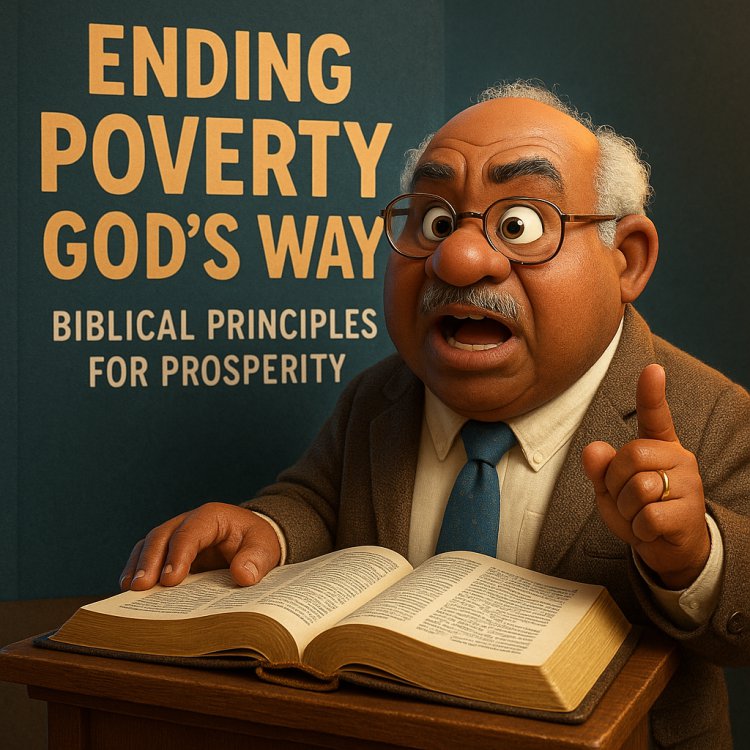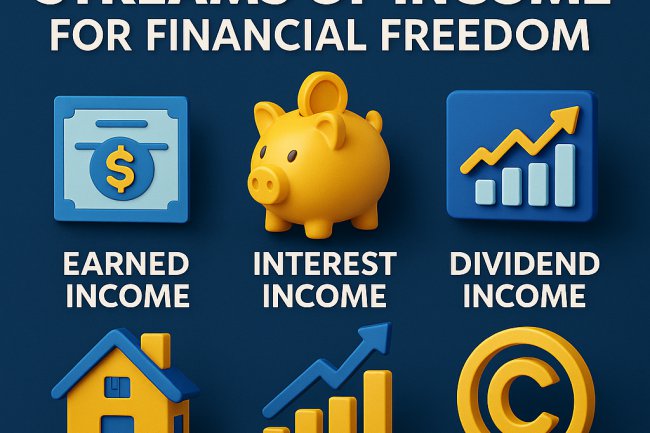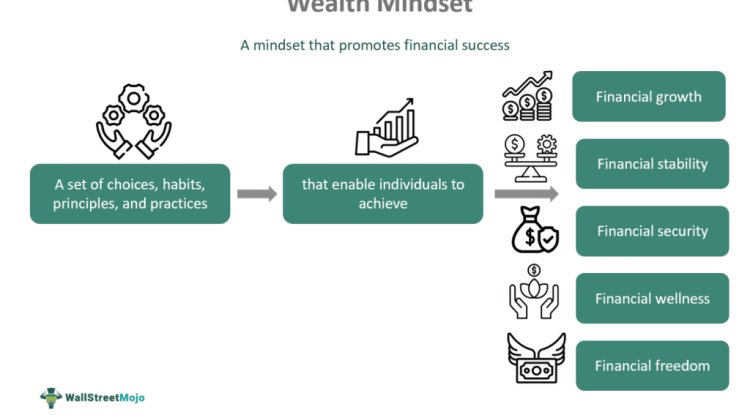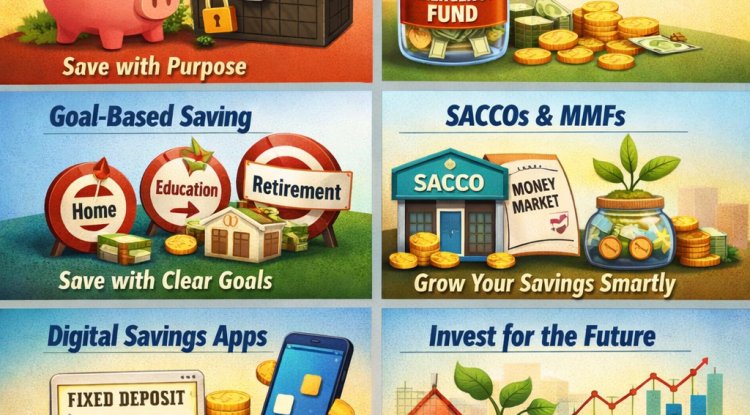End Poverty God’s Way: Biblical Wealth Creation for Faith-Driven Entrepreneurs
Discover God’s perfect plan to end poverty and create abundance. Learn biblical wealth creation principles from 1 Thessalonians 4:9–12, the role of business in God’s economy, and how to apply faith-driven strategies for lasting prosperity.

Poverty isn’t just a lack of money—it’s a spiritual and economic issue. In fact, Dr. Myron Golden often says “poverty is always a result of spiritual warfare,” implying that the battle over your prosperity starts in the spiritual realm. Too many well-meaning Christians accept scarcity, misquoting scriptures to justify lack. But God’s plan for prosperity is woven throughout the Bible, offering a path to end poverty once and for all in God’s way. In Myron Golden’s talk “How To End Poverty And Lack Once And For All,” he challenges the notion that holiness requires being broke and instead unveils biblical wealth creation principles that empower believers to thrive.
In this comprehensive guide, we’ll explore those principles—grounded in Scripture and designed for Christian entrepreneurs and professionals who refuse to separate their faith from their finances. You’ll learn how poverty must be defeated both spiritually and practically, why the Bible’s often-misused verses don’t condemn wealth, and how God’s Word lays out a blueprint for abundance, entrepreneurship, and legacy. Let’s dive in and discover God’s plan for prosperity that can help you end poverty God’s way.
Call to Action: Ready to break free from the scarcity mindset? Join our newsletter for weekly insights on biblical wealth creation and drop a comment below with your thoughts on God’s plan for your prosperity!
Poverty as a Spiritual and Economic Challenge
From Genesis to Revelation, the Bible frames poverty as more than a financial state. It’s often linked to spiritual conditions—whether disobedience, lack of knowledge, or even demonic oppression. The enemy delights in keeping God’s people in lack, but Scripture shows that God delights in our prosperity (Psalm 35:27). Addressing poverty therefore requires spiritual warfare (renewing our minds with truth) and wise action in the economic realm.
Think of poverty like a chain with two locks: one on the soul, one on the wallet. Spiritually, poverty thrives on lies—such as the belief that money is evil or that success equals greed. We must break these lies with truth from God’s Word. Economically, poverty often persists due to lack of opportunity, education, or diligence. The good news? God provides solutions for both. He “gives you the ability to produce wealth”, empowering us to create value and break financial strongholds. In other words, God has equipped you to fight poverty on both fronts: through faith and works.
To end poverty once and for all, we need to see it as God does: a bondage that can be broken. Jesus declared He was anointed “to preach good news to the poor” (Luke 4:18). That good news includes spiritual freedom and practical wisdom to escape lack. In the sections ahead, we’ll unpack those biblical strategies—from understanding God’s promises of provision to applying Kingdom principles of work and wealth. Get ready to approach poverty not with resignation, but with holy rebellion against the lack that has held you back.
God’s Plan for Prosperity in 1 Thessalonians 4:9–12
Our core scripture, 1 Thessalonians 4:9–12, reveals God’s heart for His people’s prosperity and integrity. In this passage, the Apostle Paul gives the Thessalonian believers a clear mandate that resonates with us today:
“Make it your ambition to lead a quiet life: You should mind your own business and work with your hands… so that your daily life may win the respect of outsiders and so that you will not be dependent on anybody.”
Let’s break that down. First, Paul emphasizes love and personal responsibility (v.9–10), urging believers to care for one another. Then he gets practical: aspire to a productive, diligent life. Mind your own business and work with your hands implies taking initiative—being industrious, not idle. Why? So that you earn the respect of others and lack nothing. God’s plan is that His children not live in lack or dependence; instead, we should have an abundance sufficient for our needs and to bless others.
This is a far cry from seeing poverty as piety. God’s plan for prosperity is not about greed or selfishness; it’s about stewardship, influence, and generosity. When we provide for ourselves and our families through honest work or entrepreneurship, we demonstrate integrity. We also position ourselves to help those truly in need. As Paul elsewhere commanded, “Anyone unwilling to work should not eat” (2 Thess 3:10), underscoring that able believers are expected to engage in productive labor rather than accept chronic lack.
Consider how working with your hands might translate today: It could mean launching that business idea God planted in your heart, developing a marketable skill, or diligently growing your professional career. The form of work can vary, but the principle is the same—God empowers the work of our hands to produce wealth (Deuteronomy 8:18). He wants us to be creators of value, not consumers of charity. By following 1 Thessalonians 4:11–12, we align with God’s prosperity plan: a life where we have “need of nothing” and can generously support God’s work and our neighbors in need.
Quick Insight: Notice that prosperity in this scripture is tied to character (“quiet life,” “minding your affairs”) and hard work. Biblical prosperity isn’t a lottery; it’s a byproduct of living out godly values daily. When you do, you “win the respect of outsiders,” opening doors to witness and influence. In God’s eyes, your financial independence is a testimony to His wisdom and provision.
Setting the Record Straight: Misused Verses About Money
Many Christians remain stuck in lack because of misinterpreted scriptures that cast wealth in a negative light. Let’s address two big ones:
-
“Money is the root of all evil.” This is almost what 1 Timothy 6:10 says, but not exactly. The Bible actually says “the love of money is the root of all evil”. Myron Golden highlights that people love to quote this verse without understanding it. God’s Word warns against idolizing money, not against money itself. Yes, God gives plenty of warnings about wealth: don’t trust in it, don’t be consumed by it, and don’t oppress others for it. But 1 Timothy 6:10 doesn’t mean that money inherently causes every evil. It means that when people worship money, they’ll compromise anything to get more, leading to all kinds of evil. In other words, greed is the problem, not the dollars. Money in righteous hands can do tremendous good; it’s the heart attitude that matters.
-
“You cannot serve God and mammon.” Jesus did say this (Matthew 6:24), and it’s absolutely true. But let’s clarify: “You cannot serve both God and money” means you can’t be enslaved to money while also serving God wholeheartedly. It does not mean that having money disqualifies you from serving God. In fact, Bible scholars note that Jesus isn’t suggesting Christians must be poor or that wealth is incompatible with godliness. The real issue is priority: Who is your master? If God is your master, money becomes your servant—a tool for Kingdom purposes. If money is your master, it becomes an idol. Jesus’ point is that one ultimate loyalty will always win out. As BibleRef commentary puts it, “a person sincerely serving God will not organize their lives around the acquisition of wealth. Money, for a righteous person, is just another tool given by God to be used for His purposes.”. What a powerful reframing! Serving God doesn’t require being broke; it requires putting Him first. When He’s first, any wealth He blesses you with will be managed in submission to Him, not as an idol.
By correcting these misunderstandings, we remove spiritual roadblocks that keep Christians in false guilt or passivity about money. The Bible does not teach that it’s holy to be poor or evil to be rich. It teaches that it’s holy to be faithful with whatever you have and evil to make money your god. Wealth in the hands of the righteous is a blessing—think of Joseph, David, or Job. They were devoted to God and used resources for good. It’s time to reclaim a healthy, biblical mindset: money is a neutral tool that takes on the character of the person who holds it. In your hands, surrendered to God, it can become an instrument to bless your family, fund Kingdom work, and alleviate others’ poverty.
Call to Action: Have you heard Christians use “money is the root of all evil” or “you can’t serve God and money” to justify lack? Comment below with your experience or how your perspective on these verses has changed. Let’s help others break free from this misunderstanding!
God’s Original Design for Abundance: Gold in Genesis and the Patriarchs
To truly grasp God’s heart for abundance, we must go back to the beginning—Genesis. It’s astonishing how early God establishes the presence of wealth in creation. Genesis 2:11–12 describes the rivers of Eden, noting that in the land of Havilah “there is gold, and the gold of that land is good.” Yes, the Bible literally calls gold “good” in the paradise of Eden. Before any human ever sinned or “loved money,” God placed precious resources like gold on Earth and labeled them good. The same word “good” that described the beauty of creation—trees, animals, light—describes material wealth. Money wasn’t cursed; it was created by God and called good. This should shatter the myth that God prefers a barren life for us. From Day 1, opulence and abundance were part of our birthright as children of the King.
Consider that imagery: the Garden of Eden had gold, aromatic resin, and onyx (Gen 2:12). Adam didn’t need gold coins in Eden—its presence was symbolic. God was signaling that His creation contained overflowing provision. There was no lack in Eden. By design, we were meant for more than just surviving. We were created to enjoy and steward God’s abundant resources. Poverty entered the world later, as a result of the Fall and the curse (Genesis 3:17-19), not because material provision was absent from God’s original plan.
Fast forward to the patriarchs, and you see God continuing to bless His people materially as they walk with Him. Abraham is a prime example. Genesis records that Abraham was “very rich in livestock, in silver, and in gold” (Gen 13:2). This wealth wasn’t portrayed negatively; in fact, it was part of God’s covenant blessing. One summary of Abraham’s story puts it this way: “Abraham’s wealth wasn’t just allowed—it was celebrated.” His servant Eliezer even used Abraham’s great wealth as proof of God’s favor when seeking a wife for Isaac. Clearly, the Bible does not shy away from highlighting Abraham’s prosperity as evidence of God’s promise.
Now consider Joseph. Though the Bible doesn’t list Joseph’s bank balance, his journey shows God elevating a faithful man to manage the wealth of a nation. Joseph went from slavery to second-in-command of Egypt, effectively controlling the food economy. Through divine wisdom, he implemented a plan that saved Egypt (and his family) from famine, and in the process, concentrated the wealth of Egypt under Pharaoh’s storehouses (Genesis 41:41–57, 47:14-26). Joseph’s story demonstrates wealth transfer and strategic stewardship. God used him to redistribute resources, proving that a godly person can handle vast wealth without losing integrity. Joseph remained reliant on God, declaring that “it is God who will give Pharaoh a favorable answer” (Gen 41:16) regarding the interpretation that led to prosperity. His wealth management was part of fulfilling God’s purpose to preserve life.
From Eden’s gold, to Abraham’s flocks of sheep and vaults of silver, to Joseph’s national treasury, one theme shines: God intends abundance to be in the hands of His people. Not for ego or indulgence, but to accomplish His purposes on earth. He “richly provides us with everything for our enjoyment” (1 Tim 6:17) and expects us to enjoy and employ these gifts righteously. The presence of gold in Genesis is a message: God is not limited, and neither are the resources He can route to you when you align with Him. We must stop overlooking the abundance God has placed around us, fixating instead on what’s missing. Lift your eyes—there is gold in your garden if you’re willing to see it and steward it.
The Principle of Wealth Transfer: Storing Up for the Righteous
The Bible contains a fascinating promise (and warning) often dubbed the “wealth transfer” principle. It appears in verses like Proverbs 13:22 and Ecclesiastes 2:26, suggesting that those who accumulate wealth by ungodly means won’t keep it in the end—God will reroute it to His people who please Him.
Proverbs 13:22 famously says: “A good person leaves an inheritance for their children’s children, but a sinner’s wealth is stored up for the righteous.” In other words, the wealth of the wicked eventually finds its way into the hands of the just. This isn’t a get-rich-quick guarantee; it’s a general pattern in God’s justice. Throughout history, empires and individuals who misused wealth often lost it, and those resources ended up benefiting the godly. Think of Israel leaving Egypt—after generations of slavery, God caused the Egyptians to hand over their gold and riches to the Hebrews during the Exodus (Exodus 12:35-36). The “spoils of the wicked” literally financed the journey of God’s people.
Ecclesiastes 2:26 reinforces this: “To the person who pleases Him, God gives wisdom, knowledge and happiness, but to the sinner He gives the task of gathering and storing up wealth to hand it over to the one who pleases God.” The sinner toils to pile up wealth, but ultimately, that hoard will enrich those who serve God. One translation puts it plainly: “He makes sinners work, earning and saving, so that what they get can be given to those who please Him.” What an encouragement for the righteous! If you walk faithfully, God can channel resources to you from unexpected places—yes, even from ungodly people or systems.
However, let’s approach this principle with balance. These verses are not an excuse for laziness or entitlement (“I’ll just wait for God to drop a wicked man’s fortune in my lap!”). Rather, they motivate us to live righteously and be ready. When you handle your finances God’s way—living within your means, being generous, avoiding crippling debt—you position yourself as the “righteous” person who can receive and multiply wealth for God’s glory. Meanwhile, those who gain wealth unjustly or live only for themselves often succumb to losses, judgments, or squander it away. Eventually, God’s justice prevails: resources flow to those who will use them wisely.
We see hints of this wealth transfer dynamic in modern times during economic downturns or resets. Those who overstretch in greed (for example, taking on massive debt without God’s wisdom) may lose assets, while wise, faithful stewards can acquire those assets. One financial writer observed that during the Great Depression, “people deep in debt lost their homes and farms, while those who maintained financial margin (the ‘meek’) were able to purchase those assets at huge discounts”. It’s a real-life illustration of “the meek inheriting the earth” (Matthew 5:5) – or in this case, their neighbors’ foreclosed property! The pattern is repeated: those who follow biblical principles of finance (prudence, generosity, contentment) often end up holding resources that foolish people forfeited.
So what should you do about this? Strive to be among the righteous who please God in your financial conduct. That means:
-
Manage money with integrity (no dishonest gain).
-
Be generous and willing to share, rather than hoarding (1 Timothy 6:18).
-
Avoid the bondage of excessive debt (Proverbs 22:7 says the borrower is servant to the lender).
-
Develop skills and wisdom (“wisdom dwells with prudence… riches and honor are with me,” says Wisdom in Proverbs 8:12,18).
By doing these, you’re effectively building a storehouse that God can fill. When He causes a wealth shift—as He’s done before—you’ll be ready to receive it and use it for good. Remember, the purpose of biblical wealth is not to indulge ourselves but to establish God’s covenant and bless others (Deut 8:18, Gen 12:2). Ecclesiastes reminds us that apart from God, riches are meaningless, a chasing of the wind. But in God’s hand, they become a tool for Kingdom impact. So if you sense a wealth transfer coming in our times (many believe we are on the verge of one), ask yourself: “Am I the kind of person God can trust with more?” Commit to being that righteous steward now, and you’ll be on the right side of the transfer later.
The Entrepreneurship Mandate: Work, Create Value, and Own the Vision
Entrepreneurship isn’t just a Silicon Valley concept—it’s a God-given mandate. The Bible overflows with encouragement to take initiative, be productive, and multiply what you’re given. From the cultural mandate in Genesis (“be fruitful and multiply, fill the earth and subdue it” – Gen 1:28) to Jesus’ Parable of the Talents (Matthew 25:14-30), Scripture calls God’s people to create value and take ownership of their tasks. In today’s terms, that sounds a lot like entrepreneurship!
Let’s revisit 1 Thessalonians 4:11 in this light. Paul said to “work with your hands… just as we told you”. In an age where many shun manual or hard work, the Bible esteems it. Working “with your hands” was an idiom meaning earn your own living—don’t depend on others for your provision. This mindset is the foundation of entrepreneurship: rather than waiting for someone to give you a job or a handout, use your God-given abilities to create solutions and services. It’s no accident that many of the Bible’s heroes effectively ran businesses or managed enterprises:
-
Abraham managed large herds and many servants—an ancient equivalent of a small enterprise.
-
The Proverbs 31 woman is basically described as an entrepreneur: she considers a field and buys it, plants a vineyard, makes merchandise, and trades profitably (Prov 31:16-18, 24).
-
Paul himself was a tentmaker (Acts 18:3), running a trade while doing ministry, so as not to burden others.
Beyond working hard, the Bible encourages innovation and investment. Ecclesiastes 11:2 talks about diversifying (“invest in seven ventures, yes in eight” NIV), and Jesus praised the servants who doubled their talents by trading, while condemning the one who buried his talent in fear. God is an entrepreneur at heart—the ultimate Creator who brought forth something out of nothing—and we reflect His image when we build, innovate, and take calculated risks to expand our resources and impact.
Myron Golden often emphasizes ownership as critical for wealth creation. There’s a reason he encourages people to start businesses rather than just seek raises. When you own the business, you have no income cap—your diligence and God’s favor determine your growth. Proverbs 14:23 says, “All hard work brings a profit, but mere talk leads only to poverty.” Entrepreneurs embody this by turning ideas (talk) into action (work) and reaping profit. Moreover, owning a business allows you to practice Kingdom principles freely (honesty, generosity, treating people well) without compromising in ungodly corporate cultures. It’s a platform for ministry and a mechanism for wealth creation rolled into one.
Consider also Deuteronomy 8:18, which we mentioned earlier: “Remember the LORD your God, for it is He who gives you the power to get wealth, that He may establish His covenant”. God empowers you to produce wealth as part of His covenant purpose. This implies that creating wealth can be a calling—a way to fulfill God’s purposes on earth. Entrepreneurship is a prime avenue for this, as it not only blesses you but creates jobs, funds ministries, and demonstrates godly principles in the marketplace. When you build a business on biblical values, you’re literally advancing God’s Kingdom in the economic sphere.
So what does God’s entrepreneurship mandate look like in action for you? It might mean finally launching that side hustle or full-time venture that’s been on your heart. It means approaching your work (whether as a business owner or an “intrapreneur” at your job) with creativity and diligence, knowing God is your true boss. It means solving problems for people—because all businesses exist to serve others. And importantly, it means keeping God at the center of your enterprise. As Myron Golden says, when you seek God’s Kingdom first, “everything else will follow”. Build your business through prayer, integrity, and service, and trust God to bring the increase.
Call to Action: Do you have a God-given business idea or project? Don’t wait. Write it down, pray over it, and take one step this week to move it forward. And if you haven’t yet, subscribe to our newsletter for practical tips on Christian entrepreneurship and updates on upcoming webinars—let us partner with you in turning your God-sized ideas into reality!
Myron Golden’s Testimony: From Poverty to Biblical Prosperity
Nothing drives these principles home like a real-life story, and Dr. Myron Golden’s own journey is a testament to ending poverty God’s way. He often shares how he started from very humble beginnings. Born as the second of six brothers in a segregated hospital in Tampa, Florida, Myron contracted polio as an infant and has worn a brace on his leg ever since. Despite this physical challenge, he didn’t use it as an excuse. In fact, he even trained to become a black belt in martial arts—a hint at the tenacity and discipline that would later serve him in business.
Myron grew up with limited finances (the “poverty” part of his story) and at one point worked as a garbage man—literally collecting trash for a living. He describes himself in those days as the “trash man.” But he didn’t stay there. Through faith and determination, Myron began to study biblical success principles and apply them. He ventured into sales and marketing, honing his skills and overcoming fear and rejection. Over time, he transitioned into entrepreneurship, starting businesses and ultimately becoming a highly sought-after business growth consultant and speaker.
His signature book title says it all: “From the Trash Man to the Cash Man: How Anyone Can Get Rich Starting from Anywhere.” In it, Myron shares the financial and biblical wisdom that took him from a low-wage worker to a millionaire. Importantly, he stresses “starting from anywhere” – meaning your past or present circumstances don’t define your future wealth. Myron’s story embodies the message that no matter how poor or disadvantaged your start, God’s principles can launch you into abundance. He is living proof that a faith-forward mindset, coupled with bold action, can rewrite one’s financial destiny.
A key aspect of Myron’s testimony is how he kept his faith at the center of his wealth journey. He didn’t pursue success in spite of being a Christian; he pursued it because he’s a Christian with a Kingdom mission. “My job is to please God and serve people. I’m going to do what God called me to do,” Myron declares as his life motto. This purpose-driven approach meant that when wealth came, it didn’t corrupt him; it amplified his service. He began teaching others – through the Bible Success Academy, challenges, YouTube Bible studies, etc. – the very principles that lifted him up. His strategies always blend Biblical principles with practical business tactics. This blend is why his teaching resonates with Christian entrepreneurs worldwide: it speaks to the soul and the balance sheet simultaneously.
Another inspiring facet is how Myron handled adversity. He never let polio or any hardship become an identity. Instead, he says those trials built resilience and became the “anchor” of his teachings. In other words, the areas of your deepest pain can become the source of your greatest message and authority. Myron turned his pain into purpose—now he helps others overcome financial pain with biblical truth.
Perhaps the most practical takeaway from his life is the demonstration that biblical entrepreneurship works. By applying ideas like the Four Levels of Value (a concept he teaches about increasing your earning potential) or the power of making irresistible offers, Myron grew his income dramatically. He moved from “baby entrepreneur” to running a 7-figure, then 8-figure enterprise. And he did it without sacrificing his integrity or family—values often tossed aside in pursuit of wealth. Today, as a man who has been married 30+ years and has children and grandchildren, he shows that you don’t have to lose your soul to gain prosperity. In fact, keeping your soul prospering (3 John 1:2) is the key to sustainable success.
Myron Golden’s life exemplifies the end of poverty and lack through God’s way: faith, wisdom, courage, and generosity. If God did it for a polio-stricken “trash man” from a poor background, He can do it for you. The same promises and principles work, if you work them. Let Myron’s testimony fire you up to believe that you too can be a living testimony of biblical wealth done right!
Stepping Out in Faith: Build Your Biblical Business and Break the Spirit of Poverty
At this point, you’ve seen that ending poverty God’s way is not only possible—it’s planned. God has laid out a path for you to break free from lack, through spiritual alignment and practical action. Now it’s decision time: Will you continue living under the weight of scarcity, or will you step out in faith and apply these biblical principles to your life and business?
Here’s a quick recap of what we’ve covered, as action steps for you going forward:
-
Renew Your Mind on Money: Reject the false humility that equates godliness with poverty. Embrace the truth that God calls money “good” when it’s used rightly. Memorize key verses like Deuteronomy 8:18 (God gives you power to get wealth) and 3 John 1:2 (God desires you to prosper and be in health as your soul prospers). Let Scripture define your attitude, not misquotes or traditions.
-
Engage in the Spiritual Battle: Pray against any spirit of lack or limiting beliefs that have kept you stuck. If poverty is a form of spiritual warfare, fight it with spiritual weapons—prayer, fasting, declaring God’s promises. No more saying “I’m destined to be broke.” Instead, declare like the psalmist, “The LORD is my shepherd, I lack nothing!” (Psalm 23:1).
-
Work Diligently and Creatively: Commit to “working with your hands” in whatever field God has placed you. If you have a job, work as unto the Lord and seek ways to increase your value. If you have a business or feel called to start one, don’t delay. Take that entrepreneurship mandate seriously. Create a plan, get the training you need (there are resources like Myron’s challenges that can help), and begin. Remember, all hard work yields profit (Prov 14:23).
-
Practice Kingdom Economics: Start operating by the principles of tithing, generous giving, wise saving, and prudent investing. Show God you can be trusted with more by being faithful with what you have now. As you do, you position yourself for that wealth transfer—ready to receive and steward resources as God sees fit. If you have debts, make a plan to diligently pay them down (the borrower is servant to lender, so freedom from debt is freedom from another form of bondage).
-
Surround Yourself with Believers on the Same Journey: Don’t walk this road alone. Join a community of Christian entrepreneurs and wealth-builders (if you haven’t yet, hit that subscribe button for Global Wealth Insights – we’re building exactly that community!). Fellowship with those who will celebrate your wins, pray in your dry seasons, and keep you accountable to Kingdom values. Remember Proverbs 13:20, “Walk with the wise and become wise, for a companion of fools suffers harm.” Stick with the wealth-wise, not the wealth-foolish.
In closing, consider this your rallying cry: Poverty and lack do not have to be your story. You serve Jehovah Jireh, the God who provides! It’s time to align with His Word and take action. Like the Israelites stepping into the Promised Land, there may be giants (challenges, fears, old habits) to face, but God has given you the land—it’s flowing with milk, honey, and yes, gold. Go in and possess it.
Your journey to “end poverty and lack once and for all” can start today. Don’t just be a hearer of these principles—be a doer. Pray and ask God for your next step, then do it with boldness, knowing He wants you to succeed more than you do. As you prosper in God’s way, you will lift others with you and demonstrate to the world what “God’s plan for prosperity” truly looks like: a blessed life that overflows to bless others, all while honoring the One who gives us the power to get wealth.
Final Call to Action: If this article inspired you, share it on social media to spread these biblical wealth principles to those who need it. And don’t forget to leave a comment with your thoughts or a testimony of God’s provision in your life. Let’s encourage one another! If you’re hungry for more, subscribe for updates and resources from Global Wealth Insights. Together, as faith-driven entrepreneurs, we will break the chains of poverty and advance God’s Kingdom—one business, one family, one miracle at a time.
Go forth and prosper, to the glory of God.
Scripture References: 1 Thessalonians 4:9–12; 1 Timothy 6:10; Matthew 6:24, 33; Genesis 2:11–12; Genesis 13:2; Genesis 41; Proverbs 13:22; Ecclesiastes 2:26; Deuteronomy 8:18; Matthew 25:14–30; 3 John 1:2; and more. (All scriptures are quoted or paraphrased from NIV/KJV and are used to illustrate biblical principles of wealth.)
What's Your Reaction?




















